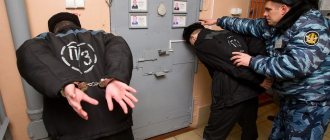1. Serving imprisonment is assigned to: a) persons convicted of crimes committed through negligence, as well as persons sentenced to imprisonment for committing intentional crimes of minor and medium gravity, who have not previously served imprisonment - in colony settlements. Taking into account the circumstances of the commission of the crime and the identity of the perpetrator, the court may assign the indicated persons to serve their sentences in general regime correctional colonies, indicating the reasons for the decision; b) men sentenced to imprisonment for committing serious crimes who have not previously served imprisonment, as well as women sentenced to imprisonment for committing serious and especially serious crimes, including any type of recidivism - in general regime correctional colonies; c) men sentenced to imprisonment for committing especially serious crimes, who have not previously served imprisonment, as well as in case of relapse or dangerous relapse of crimes, if the convicted person has previously served imprisonment - in high-security correctional colonies; d) men sentenced to life imprisonment, as well as in cases of particularly dangerous recidivism - in special regime correctional colonies.
2. For men sentenced to imprisonment for committing especially serious crimes for a term of more than five years, as well as in the event of a particularly dangerous recidivism of crimes, serving part of the sentence may be assigned to prison, while the court counts the time the convicted person is in custody until it enters into legal force conviction while serving a sentence in prison.
3. Persons sentenced to imprisonment who have not reached the age of eighteen at the time the court pronounces the verdict are assigned to serve their sentence in educational colonies.
4. Changing the type of correctional institution is carried out by the court in accordance with the penal legislation of the Russian Federation.
What is the type of correctional facility?
A correctional institution is usually understood as the place where those sentenced to imprisonment serve their sentences..
Punishment in the form of restriction of freedom is imposed by the court for the commission of crimes of minor and medium gravity, as well as for grave and especially grave criminal acts.
The crimes included in the above categories differ in nature and degree of danger to society.
Convicts also differ in their moral, social and psychological qualities. In other words, they exhibit varying degrees of negative deviation from accepted social norms in their views, worldview, beliefs, skills, in their assessment of their personality and attitude towards other citizens, in their understanding of what is permitted and prohibited and other social values.
That is why there is a need to differentiate convicts who differ from each other in the methods of committing crimes, in goals, motives, the object of the attack, etc.
The activities of correctional institutions are regulated by the Criminal Executive Code, Law No. 5473-1 and other regulations.
Case No. 10-6/2019
DECISION OF APPEAL
Kirs June 03, 2021
Verkhnekamsky District Court of the Kirov Region, composed of presiding judge O.V. Chastikova,
with the participation of the state prosecutor, deputy prosecutor of the Verkhnekamsk district of the Kirov region Vasenev D.V.,
defense lawyer Kuzikov A.A., who presented certificate No. 730 dated 04/11/2013 and warrant No. 042866 dated 05/29/2019,
defendant Ashkanov V.V.,
with the secretary of court hearings N.A. Kushkova,
having considered, on appeal, in open court using a video conferencing system in the premises of the Verkhnekamsk District Court of the Kirov Region, Kirs, a criminal case on appeal from the state prosecutor, assistant prosecutor of the Verkhnekamsk District, Kirov Region, N.V. Lebedeva. and on the appeal of Ashkanov V.V. on the verdict of the magistrate of judicial district No. 6 of the Verkhnekamsky judicial district of the Kirov region dated April 09, 2021, by which
Ashkanov Vladimir Vladimirovich
, DD.MM.YYYY year of birth, native of <address>, citizen of the Russian Federation, secondary education, single, no dependents, not working, disabled group 3, not liable for military service, registered and residing at the address: <address>, previously convicted:
1) 02/25/2013 Verkhnekamsky District Court of the Kirov Region under Part 4 of Art. 111 of the Criminal Code of the Russian Federation to 9 years of imprisonment with restriction of freedom for 1 year, with the main sentence being served in a high-security correctional colony. By resolution of the Bor City Court of the Nizhny Novgorod Region dated December 18, 2018, he was released on parole for 2 years 10 months 05 days;
convicted of committing a crime under Part 1 of Art. 314, part 7 art. 79, Art. 70 of the Criminal Code of the Russian Federation to 3 years of imprisonment with serving the sentence in a high-security correctional colony, with restriction of freedom for 8 months 19 days,
U S T A N O V I L:
By the verdict of the magistrate of judicial district No. 6 of the Verkhnekamsky judicial district of the Kirov region dated April 9, 2021, Ashkanov V.V. convicted of malicious evasion of a person sentenced to restriction of freedom from serving a sentence, that is, for committing a crime under Part 1 of Art. 314 of the Criminal Code of the Russian Federation to 4 months in prison. Based on paragraph “c” of Part 7 of Art. 79 of the Criminal Code of the Russian Federation, the parole of Vladimir Vladimirovich Ashkanov was canceled by the verdict of the Verkhnekamsky District Court of the Kirov Region dated February 25, 2013.
Based on Art. 70 of the Criminal Code of the Russian Federation for the totality of sentences, the unserved part of the punishment according to the verdict of the Verkhnekamsky District Court of the Kirov Region dated February 25, 2013 was partially added to the imposed punishment and was finally assigned to V.V. Ashkanov. punishment of 3 years of imprisonment to be served in a high security correctional colony with restriction of freedom for a period of 8 months 19 days.
Ashkanov V.V. the following restrictions have been established: do not leave the apartment at night (from 10 p.m. to 6 a.m.), do not travel outside the territory of the municipal entity (municipal entity “Verkhnekamsky Municipal District”), do not change your place of residence or stay without the consent of the specialized government agency responsible for supervision over the serving of a sentence in the form of restriction of freedom by a convicted person. On Ashkanov V.V. imposed the obligation to appear twice a month to register with a specialized state body that supervises the serving of sentences in the form of restriction of freedom by convicts.
By the verdict of the Verkhnekamsk District Court of the Kirov Region dated 02.25.2013 Ashkanov V.V. convicted under Part 4 of Art. 111 of the Criminal Code of the Russian Federation to punishment in the form of 9 years of imprisonment with restriction of freedom for a period of 1 year with the establishment of the following restrictions: do not leave the apartment at night (from 22 to 6 o'clock), do not travel outside the territory of the municipal formation (municipal formation " Verkhnekamsk municipal district"), not to change the place of residence and stay without the consent of the specialized state body that supervises the serving of sentences in the form of restriction of freedom by convicts. He is entrusted with the obligation to appear at the specialized state body that supervises the serving of convicts' sentences in the form of restriction of freedom twice a month for registration.
12/29/2018 Ashkanov V.V. released from PKU IK-11 of the Federal Penitentiary Service of Russia in the Nizhny Novgorod Region on parole by order of the Bor City Court of the Nizhny Novgorod Region dated December 18, 2018 on the basis of Art. 79 of the Criminal Code of the Russian Federation for 2 years 10 months 05 days. In accordance with this resolution, when releasing Ashkanov V.V. The administration of the correctional institution issued an order on the obligation to appear at the disposal of the branch in the Verkhnekamsk region of the Federal Institution of the Penitentiary Institute of the Federal Penitentiary Service of Russia in the Kirov region at the address: Kirs, st. Shironina, 9 Kirov region, where he must go according to the route sheet: Bor-Novgorod-Kirov-Kirs and arrive no later than 01/02/2019. At the same time, the administration of the correctional institution Ashkanov V.V. warned of liability for failure to appear at the police department within the prescribed period by putting his signature on the order issued on December 29, 2018.
Ashkanov V.V., knowing that he has an additional punishment in the form of restriction of freedom, having arrived from FKU IK-11 of the Federal Penitentiary Service of Russia in the Nizhny Novgorod Region to his place of residence, in the period from 01/02/2019 to 01/17/2019, deliberately, ignoring the issued order, in order to evade serving a sentence in the form of restriction of freedom, without a good reason, he did not appear for registration at the branch in the Verkhnekamsk region of the Federal Institution of the Federal Penitentiary Institution of the Federal Penitentiary Service of Russia in the Kirov Region. Ashkanov V.V. registered in the Verkhnekamsk district branch of the Federal Institution of the Federal Penitentiary Institute of the Federal Penitentiary Service of Russia in the Kirov region on 01/17/2019.
In accordance with paragraph “g” of Part 4 of Art. 58 of the Penal Code of the Russian Federation, a convicted person who has not arrived at the penal inspection at his place of residence in accordance with the order issued by the administration of the correctional institution is considered to be maliciously evading the serving of a sentence in the form of restriction of freedom.
On the verdict of the magistrate, the state prosecutor, assistant prosecutor of the Verkhnekamsk district of the Kirov region Lebedeva N.V. an appeal was submitted, which indicated that in the actions of Ashkanov V.V. the presence of an aggravating circumstance in the form of a simple relapse was established, and the presence of mitigating circumstances in the form of a full admission of guilt, remorse for the deed, and active assistance in the investigation of the crime. Under such circumstances, the court decided when appointing V.V. Ashkanov. punishment apply the provisions of Part 3 of Art. 68 of the Criminal Code of the Russian Federation and assign him less than one-third of the maximum term of the most severe type of punishment provided for committing a crime. At the same time, the court, when imposing punishment, the provisions of Part 3 of Art. 68 of the Criminal Code of the Russian Federation did not actually apply, imposed a sentence of 4 months of imprisonment, which is one third of the most severe type of punishment provided for committing a crime, that is, appointed V.V. Ashkanova. excessively harsh punishment.
In addition, when rendering the verdict, the court canceled the parole by the verdict of the Verkhnekamsky District Court of the Kirov Region dated February 25, 2013 on the basis of paragraph “c” of Part 7 of Art. 79 UKRF. Currently Ashkanov V.V. committed a crime under Part 1 of Art. 314 of the Criminal Code of the Russian Federation, and related to the category of crimes of minor gravity, in connection with which the conditional early release of Ashkanov V.V. should be canceled on the basis of paragraph “b” of Part 7 of Art. 79 of the Criminal Code of the Russian Federation.
In the appeal, Ashkanov V.V. asks to review the sentence, indicating that he was unable to register with the Penitentiary Institution on time due to an accidental combination of circumstances and serious life problems; does not agree with the recognition of his actions as a relapse; When pronouncing the sentence, the judge did not take into account the entire set of mitigating circumstances: admission of guilt, repentance, active assistance in the investigation, committing the crime unintentionally, a satisfactory characterization, as well as difficult life circumstances and a combination of circumstances: he traveled to his place of residence at his own expense, there were days off, There was chaos in the apartment at the place of residence.
At the court hearing of the appellate instance, Deputy Prosecutor of the Verkhnekamsk District of the Kirov Region Vasenev D.V. the presentation was supported, the appeal of Ashkanov V.V. asked to be left without satisfaction.
Ashkanov V.V. at the court hearing he agreed with the prosecutor’s appeal submission; supported the arguments of the appeal.
Lawyer Kuzikov A.A. supported the arguments of the appeal and the appeal presentation.
After listening to the parties and examining the case materials, the court comes to the following conclusion.
At the court hearing of the first instance, the defendant Ashkanov V.V. explained that he was guilty of committing a crime under Part 1 of Art. 314 of the Criminal Code of the Russian Federation, fully admits, on December 29, 2018, he was released from PKU IK-11 of the Federal Penitentiary Service of Russia in the Nizhny Novgorod Region, he was given money and documents for which he signed. He knew that he had an additional punishment in the form of restriction of freedom. I took a bus to Nizhny Novgorod, missed the train to Kirov, bought a ticket with my own funds, arrived in Kirov at night on December 30, 2018, went to see a friend, and decided to stay with him. As of 01/01/2019 there were no bus tickets to Rudnichnoye; he bought a ticket for 01/02/2019. The next day, to register, I went to the Rudnichny PP, but everything was closed there; I registered on parole on 01/09/2019. District police officer S. said that he needed to get a certificate from a narcologist and register with the Penitentiary Inspectorate, but he did not understand where exactly. On January 10, 2019, I went to Kirs to see a narcologist, but did not go to the UII. On January 17, 2019, I received a call from the Rudnichny PP, where an employee of the UII Ts. registered him. He did not read or delve into the documents received upon release. There were no valid reasons for failure to appear at the Inspectorate.
Having analyzed the testimony of V.V. Ashkanov, comparing it with other evidence in the case, the court of first instance came to a reasonable conclusion that the guilt of the convicted person in the crime had been proven.
The court's conclusions about the guilt of V.V. Ashkanov in the crime committed correspond to the actual circumstances of the case and are confirmed by the totality of evidence examined at the court hearing, the analysis of which is given in detail in the verdict, in particular:
- testimony of witness Ts., from which it follows that he holds the position of senior inspector of the Omutninsky intermunicipal branch of the PKU UII UFSIN of Russia for the Kirov region, on January 16, 2019, documents on V.V. Ashkanov were received from the PKU IK-11 GUFSIN of Russia in the Nizhny Novgorod region to the UII. , including an order that no later than 01/02/2019 he must arrive at the branch of the Federal Penitentiary Institution of the Federal Penitentiary Service of Russia in the Kirov region, Kirs. She began to look for V.V. Ashkanov, and on January 17, 2019, she went to the village of Rudnichny, where the district police officer explained to her that V.V. Ashkanov. arrived in the village of Rudnichny and registered on parole. Upon a call from the district police officer, V.V. Ashkanov. came to the police department, where she took an explanation from him, in which he explained that he had no valid reasons for not appearing at the police department, and was at his place of residence. He was found to be maliciously evading serving a sentence of restriction of freedom and was registered;
- the announced testimony of witness U., from which it follows that he holds the position of special accounting inspector of PKU IK-11 of the Federal Penitentiary Service of Russia for the Nizhny Novgorod Region. On December 29, 2018, convict V.V. Ashkanov was released from penal colony No. 11, who, in addition to other documents, was given an order indicating the date of arrival and the address of the correctional institution, and was explained about the obligation to register with a specialized state body, about criminal liability for late arrival and evasion registration, for which Ashkanov V.V. signed. It was explained to him that all documents would be sent to his place of departure. Ashkanov V.V. explained that his duties and the procedure for registering were clear to him, he had no questions, he explained that he would definitely come to a specialized state body and register;
- the announced testimony of witness S., from which it follows that he is the precinct commissioner of the Rudnichny PP of the Russian Ministry of Internal Affairs for the Verkhnekamsk region, on 01/09/2019 V.V. Ashkanov came to the Rudnichny PP, who was released on parole from the penal colony -11 GUFSIN of Russia in the Nizhny Novgorod region. During the conversation, it was established that Ashkanov V.V. should have registered with the UII no later than 01/02/2019, which he did not do. He warned V.V. Ashkanov that, according to the sentence, he has a restriction of freedom and must register with the Penitentiary Inspectorate. On January 17, 2019, it was established that Ashkanov V.V. did not register with the UII.
In addition, the court of first instance examined:
- information from the senior inspector of the Omutninsky intermunicipal branch of the Federal Penitentiary Institution of the Federal Penitentiary Service of Russia in the Kirov Region that on January 16, 2019, documents were received for the convicted V.V. Ashknov, who was supposed to arrive at the branch no later than January 2, 2019; until January 17, 2019, convicted Ashkanov V.V. did not arrive at the correctional facility without good reason, was found to be maliciously evading serving a sentence of restriction of freedom;
- a copy of the verdict of the Verkhnekamsky District Court of the Kirov Region dated February 25, 2013, according to which Ashkanov V.V. found guilty of committing a crime under Part 4 of Art. 111 of the Criminal Code of the Russian Federation and he was sentenced to 9 years of imprisonment with restriction of freedom for a period of 1 year, serving the main sentence in a high-security correctional colony. To serve an additional sentence in the form of restriction of freedom, the following restrictions are established: do not leave the apartment at night (from 10 p.m. to 6 a.m.); do not travel outside the territory of the municipal entity (Municipal entity “Verkhnekamsky Municipal District”); not to change the place of residence and stay without the consent of the specialized state body that supervises the serving of the convicted person’s sentence in the form of restriction of freedom. On the convicted Ashkanov V.V. an obligation has been imposed to appear twice a month to register with a specialized state body that supervises the serving of sentences by convicts in the form of restriction of freedom;
- a copy of the resolution of the Bor City Court of the Nizhny Novgorod Region dated December 18, 2018, according to which Ashkanov V.V. released on parole for 2 years 10 months 05 days, assigned the obligation to register with a specialized state body that monitors the behavior of the person released on parole; not change your permanent place of residence and work without notifying the specialized government agency that monitors the behavior of the person released on parole; periodically appear at this body for registration; The provisions of Part 7 of Art. 79 of the Criminal Code of the Russian Federation;
- a copy of the certificate from the head of PKU IK-11 of the GUFSIN of Russia for the Nizhny Novgorod region about the release of V.V. Ashkanov. 12/29/2018 by order of the Bor City Court of the Nizhny Novgorod Region dated 12/18/2018 on parole for 2 years 10 months 05 days;
- copy of order No. 79 dated December 29, 2018, according to which Ashkanov V.V. should be at the disposal of the branch for the Verkhnekamsk region of the Federal Institution of the Institution of the Federal Penitentiary Service of the Federal Penitentiary Service of Russia in the Kirov region at the address: Kirov region, Kirs, st. Shironina, 9, where he must arrive no later than 01/02/2019, he was warned about liability for failure to appear at the correctional institute on time or evasion from serving a sentence, which is signed by V.V. Ashkanov;
- copy of V.V. Ashkanov’s subscription. dated December 29, 2018, stating that he undertakes to appear at the correctional institute upon arrival;
- copy of Ashkanov V.V.’s explanatory note. that on 01/02/2019 he arrived in the village of Rudnichny, Verkhnekamsk district, in the period from 01/02/2019 to 01/17/2019 at the UII branch at the address: Kirs, st. Shironina, 9 did not arrive without a good reason, was at his place of residence, was notified that he was found to be maliciously evading serving a sentence of restriction of freedom;
— electronic travel documents of Russian Railways in the name of V.V. Ashkanov, bus tickets.
This evidence was assessed by the court of first instance in accordance with the requirements of the law in terms of its reliability, relevance, admissibility, and in total - sufficiency for the correct resolution of the case.
Qualification of actions of Ashkanov V.V. according to Part 1 of Art. 314 of the Criminal Code of the Russian Federation is correct, based on the evidence examined at the court hearing and the factual circumstances of the case established by the court. Ashkanov V.V. committed malicious evasion of a person sentenced to restriction of freedom from serving his sentence.
Contrary to the arguments of the complaint, when appointing Ashkanov V.V. punishment, the court of first instance fully took into account the nature and degree of social danger of the crime, information about the identity of the convicted person, mitigating and aggravating circumstances.
The court of first instance rightly recognized as mitigating circumstances the admission of guilt, repentance for the deed, and active assistance in the investigation of the crime. Grounds for recognition as a mitigating circumstance of clause “e”, part 1 of Art. 61 of the Criminal Code of the Russian Federation, that is, the commission of a crime due to a combination of difficult life circumstances, was not established by the court of first instance. This mitigating circumstance was not confirmed by the appellate court either.
Contrary to the arguments of the complaint, the court of first instance also rightfully recognized the recidivism of crimes as an aggravating circumstance, on the basis of Part 1 of Art. 18 of the Criminal Code of the Russian Federation, which is simple, in the presence of an unexpunged and outstanding conviction for committing an intentional crime according to the verdict of the Verkhnekamsky District Court of the Kirov Region dated February 25, 2013.
The court of first instance reasonedly concluded that Ashkanov V.V. a sentence of imprisonment should be imposed using Part 3 of Art. 68 of the Criminal Code of the Russian Federation, as well as cancel parole under the sentence of February 25, 2013 and finally impose a punishment according to the rules of Art. 70 of the Criminal Code of the Russian Federation. There are no new circumstances that the court of first instance would not take into account when determining the type or amount of punishment. Grounds for application of the provisions of Art. Art. 64, 73 of the Criminal Code of the Russian Federation, the court of first instance did not see what the court of appeal agreed with.
Thus, the appeal of Ashkanov V.V. cannot be satisfied.
The appellate court did not establish any violations of the criminal law or the criminal procedural law that entailed the reversal of the sentence.
At the same time, in accordance with paragraphs. 3.4 tbsp. 389.15, part 2 art. 389.18 of the Code of Criminal Procedure of the Russian Federation, the sentence of the magistrate is subject to change due to the incorrect application of the criminal law by the court of first instance, expressed in violation of the requirements of the General Part of the Criminal Code of the Russian Federation, as well as the injustice of the sentence.
In accordance with Part 2 of Art. 297 of the Code of Criminal Procedure of the Russian Federation, a sentence is recognized as legal, reasonable and fair if it is pronounced in accordance with the requirements of this Code and is based on the correct application of the criminal law.
In accordance with Part 3 of Art. 68 of the Criminal Code of the Russian Federation for any type of recidivism of crimes, if the court has established mitigating circumstances provided for in Article 61 of the Criminal Code of the Russian Federation, the sentence may be assigned less than one third of the maximum term of the most severe type of punishment provided for the crime committed, but within the sanction of the relevant article of the Special Part Criminal Code of the Russian Federation.
This requirement of the law was not fulfilled by the court of first instance. Reasonably pointing out the application of Part 3 of Art. 68 of the Criminal Code of the Russian Federation, the court of first instance did not actually apply the provisions of this part and article of the Criminal Code of the Russian Federation, imposing a punishment of 4 months of imprisonment, which is one third of the maximum term of the most severe type of punishment provided for the crime committed. Thus, the court imposed an excessively severe punishment, which is subject to mitigation.
The court's conclusions on the need to cancel Ashkanov V.V. conditional early release by the verdict of the Verkhnekamsky District Court of the Kirov Region dated February 25, 2013, the subsequent assignment of a sentence based on the totality of sentences, which is ordered to be served in a high-security correctional colony, meets the requirements of the current legislation, is correct and motivated, based on the information examined at the court hearing about the identity of the convicted person.
At the same time, when rendering the verdict, the court of first instance canceled the parole by the verdict of the Verkhnekamsky District Court of the Kirov Region dated February 25, 2013 on the basis of paragraph “c” of Part 7 of Art. 79 of the Criminal Code of the Russian Federation, that is, it canceled parole when a convicted person commits a serious or especially serious crime.
In accordance with Art. 15 of the Criminal Code of the Russian Federation, a crime provided for in Part 1 of Art. 314 of the Criminal Code of the Russian Federation, belongs to the category of crimes of minor gravity. Accordingly, the court of first instance should have revoked the parole on the basis of paragraph “b” of Part 7 of Art. 79 of the Criminal Code of the Russian Federation, that is, when the convicted person commits an intentional crime of minor gravity.
The court of appeal did not establish any other violations of the criminal law or the criminal procedural law that entailed the reversal or modification of the sentence.
Based on the above and guided by Art. 389.13, 389.20, 389.28 and 389.33 Code of Criminal Procedure of the Russian Federation, court of appeal
P O S T A N O V I L:
Appeal presentation of the state prosecutor, assistant prosecutor of the Verkhnekamsk District Court of the Kirov Region Lebedeva N.V. to satisfy:
The verdict of the magistrate of judicial district No. 6 of the Verkhnekamsky judicial district of the Kirov region dated April 09, 2021 in relation to Vladimir Vladimirovich Ashkanov is amended:
— Vladimir Vladimirovich Ashkanov was found guilty of committing a crime under Part 1 of Art. 314 of the Criminal Code of the Russian Federation and sentence him to 3 months of imprisonment.
Based on paragraph “b” of Part 7 of Art. 79 of the Criminal Code of the Russian Federation to cancel the parole of V.V. Ashkanov. by the verdict of the Verkhnekamsky District Court of the Kirov Region dated February 25, 2013.
Based on Art. 70 of the Criminal Code of the Russian Federation for the totality of sentences, partially add to the imposed punishment the unserved part of the punishment according to the verdict of the Verkhnekamsky District Court of the Kirov Region dated February 25, 2013 and finally assign V.V. Ashkanova. punishment of 2 years 11 months of imprisonment to be served in a high security correctional colony with restriction of freedom for a period of 8 months 19 days.
Set Ashkanova V.V. the following restrictions: do not leave the apartment at night (from 10 p.m. to 6 a.m.); do not travel outside the territory of the municipal entity (Municipal entity “Verkhnekamsky Municipal District”); not to change the place of residence and stay without the consent of the specialized state body that supervises the serving of the convicted person’s sentence in the form of restriction of freedom.
Impose on the convicted Vladimir Vladimirovich Ashkanov the obligation to appear twice a month to register with a specialized state body that supervises the serving of sentences by convicts in the form of restriction of freedom.
The rest of the sentence remains unchanged.
The appeal of Vladimir Vladimirovich Ashkanov is left without satisfaction.
The appeal decision can be appealed in cassation to the Kirov Regional Court within one year from the date of its adoption.
Presiding officer O.V. Chastikova
Purpose of correctional institutions
The correctional institution is assigned specific tasks to implement the norms of penal legislation specified in Part 2 of Art. 9 PEC.
The main ones concern:
- the established regime for serving the sentence;
- carrying out educational work with prisoners;
- organization of socially useful work;
- prisoners receiving general and vocational education;
- methods of social influence.
The key task of the Russian penitentiary institution is to ensure the serving regime . To implement this, correctional institutions keep records of convicts (in the prescribed manner), distribute them among units and labor facilities, control the behavior of convicts and personnel working with them, and maintain the necessary level of isolation from the outside world and from other groups of convicts.
In order to ensure order, measures are taken to maintain the discipline of convicts, to apply incentives and disciplinary sanctions to them. Corrective action is also aimed at instilling in convicts respect for law and order in places of deprivation of liberty.
Organizing the work of convicts is one of the primary tasks of correctional institutions . Prisoners are recruited to work taking into account their gender, age, health status, ability to work, and sometimes taking into account their specialty.
They work in the production workshops of correctional institutions, at federal state-owned enterprises of a unitary nature, or are involved in the economic maintenance of the correctional institutions in which they are located.
The task of carrying out educational work with prisoners is realized through propaganda events, cultural and sports work.
It is mandatory to conduct individual conversations with convicts based on studying the personality of each of them and using psychological and pedagogical methods of influence. Religious instruction and education has an educational effect on prisoners.
To solve educational and professional problems, a network of educational organizations has been created in the educational institution . The training of convicts in educational colonies is carried out especially intensively.
The construction of an information management system is influenced by political, socio-economic and spiritual factors. These include indicators of the criminal legal, demographic and correctional characteristics of convicts.
According to the norms of international acts and penal legislation, correctional institutions implement the principle of differentiated detention of prisoners depending on age and gender, the nature and degree of danger of the act committed, the term of punishment and the presence or absence of previously committed acts.
It is considered necessary to isolate some convicts and separate detention of a number of categories (for example, convicts serving a life sentence, juvenile offenders, those convicted of particularly dangerous recidivism, etc.).
Thus, on the one hand, correctional institutions of different types have been created, on the other hand, in a penitentiary institution of the same type, different categories of convicts serve their sentences separately, which makes it possible to exert a corrective influence on prisoners in different ways, take into account the severity and nature of the committed act, the personality of the criminal, and trace the dynamics its changes in the process of serving the sentence.
Types of correctional institutions in the Russian Federation
In Russia, there are several types of correctional institutions to which prisoners deprived of their liberty by a court decision are sent. Let's look at each of them further.
Pre-trial detention center
This is the name of the pre-trial detention center, which houses prisoners and, in some cases, prisoners serving sentences of up to six months and those who have received punishment for the first time.
Also, if the article allows, prisoners who have expressed a desire to serve their sentences here and do chores are left in the pre-trial detention center.
Correctional colonies
These institutions come in several types:
- Colony-settlement . Convicts who have committed minor acts or crimes through negligence, as well as prisoners who were transferred from other correctional institutions by court decision, serve their sentences here.
- General mode IR. These institutions house prisoners who have committed serious crimes, repeat offenders, and those transferred from children's correctional institutions (once they reach the age of 18 or 21).
- Maximum security correctional colony. In such institutions, those convicted of serious crimes serve their sentences, often with recidivism; persons transferred from a penal colony with a less stringent regime for violating conditions of detention; criminals who received life sentences.
- Prisons. Men with sentences of more than 5 years serve their sentences here, as well as criminals transferred from colonies for constant violation of the regime. Convicted women and criminals sentenced to serve life sentences are not kept in prisons.
- Medical correctional institutions. They contain sick prisoners who need compulsory psychiatric treatment, according to a court verdict, and treatment of chronic diseases.
- Age-related PSs of different types. Juvenile offenders are kept in such institutions. Here they not only work, but also receive education (secondary and special secondary).
IUs of all types do not contain together:
- adult and juvenile prisoners;
- men and women;
- sentenced to life along with those sentenced to other terms of imprisonment.
Separate correctional facilities are provided for prisoners who previously worked in law enforcement agencies.
Purpose of the type of correctional institution
The assignment of a type of correctional facility to convicts is regulated by Art. 58 of the Criminal Code of the Russian Federation, according to which serving a sentence in the form of restriction of freedom is assigned:
- In colony settlements : all adults convicted of crimes committed through negligence, as well as those who have committed an intentional crime of minor or moderate gravity for the first time.
- In general regime colonies : for the first time convicted of committing serious crimes, men and women, convicted of committing serious and especially serious crimes and in cases of any type of relapse.
- In maximum security colonies : for male criminals convicted of particularly serious acts, who have not previously served imprisonment, as well as for repeat crimes.
- In a special regime penal colony : male persons sentenced to life imprisonment, as well as especially dangerous repeat offenders.
- In prisons : for men convicted of committing particularly serious crimes for a term of more than 5 years, as well as for particularly dangerous recidivism.
- In juvenile correctional colonies : for convicted persons who have not reached 18 years of age at the time of sentencing.
Commentary on Article 58 of the Criminal Code of the Russian Federation
1. Correctional institutions intended for serving sentences of imprisonment are correctional colonies, educational colonies, and prisons.
2. The type of correctional colony (settlement colony, general, strict, special regime colony) depends: on the sex of the convicted person; forms of guilt of the crime committed, its categories; the presence or absence of relapse, its type, as well as whether the person has previously served a sentence of imprisonment (Resolution of the Plenum of the Supreme Court of the Russian Federation of November 12, 2001 No. 14 “On the practice of appointing types of correctional institutions by courts” <1>).
——————————— <1> BVS of the Russian Federation. 2002. N 1.
3. Those who have previously served a sentence of imprisonment include:
1) a person who was sentenced to imprisonment and served it in a correctional colony or prison;
2) conditionally sentenced to imprisonment, who, on the grounds set out in Parts 3 - 5 of Art. 74 of the Criminal Code, was sent to serve imprisonment in a correctional colony;
3) a person sentenced to imprisonment, who, upon entry into force of the sentence, served this sentence in a pre-trial detention center in accordance with Art. 77 Penal Code of the Russian Federation;
4) a person sentenced to imprisonment, who has served part of his sentence and was released from prison due to illness on the basis of Parts 1 and 2 of Art. 81 CC;
5) a person sentenced to imprisonment, who, after serving part of the sentence, is released from prison on parole, or a convict, for whom the remaining unserved part of the imprisonment has been replaced with a more lenient punishment;
6) a person sentenced to imprisonment by a sentence of another state (including CIS countries), who, in connection with his subsequent transfer to Russia for further serving of the sentence, served imprisonment in a correctional institution of the Russian Federation in accordance with a court decision to accept the sentence for execution.
Changing the type of correctional facility
Changing the type of administrative authority is considered by the court, in accordance with Art. 78 of the Penal Code of the Russian Federation, and is determined depending on the behavior of the convicted person and his attitude to work. In addition, there is also an established time limit.
Convicts who are characterized on the positive side can be transferred to serve their sentence from prison to a colony after they have served at least half of their sentence in prison; from a special regime penal colony to a strict regime institution after they have served half their sentence there; from a general regime penal colony - to a settlement colony - after at least ¼ of the sentence has passed; from a strict regime penal colony - to a settlement colony - after at least 1/3 of the sentence has passed, and for those convicted of committing especially serious crimes - after at least 2/3 of the sentence has passed.
The following persons have the right to apply to the court with a petition to the administration of the correctional institution to change the type of institution:
- the convicted person himself or his legal representative;
- advocate;
- PS administration.
The petition is sent to the court within 10 days after submission to the administration, along with a description of the convicted person and, in some cases, a medical report from a doctor.
The administration of the correctional institution also has the right to apply to the court with a petition to change the type of correctional institution for the convicted person, both in the direction of improvement and in the direction of worsening its content.
Petition to change the type of correctional institution
At ___________________________ (name of court) address: __________________________________________
through ___________________________________________ (name of the institution executing the sentence in which the convicted person is serving his sentence)
from _________________________ (full name of the convicted person)
Option. from a lawyer ____________________________ (full name) Lawyer ID No. _______________________, Warrant for execution of assignment No. ________________, issued by _______________________________________, (name of legal entity) address: _________________________________________, telephone: ______________, fax: _________________, email address: ________________________
Case N __________________________________________
Petition to change the type of correctional institution to a colony-settlement
By the verdict of _____________________________ (name of the court) dated “___”_______ ____, ________________________________ (full name, date of birth) was convicted under Part ___ Art. ___ of the Criminal Code of the Russian Federation to imprisonment for a period of __________ with detention in a correctional colony of ____________________ regime. The unserved portion of the sentence is __________. During the entire period of serving the sentence, the convict does not commit malicious violations of the internal regulations of the institution, is positively characterized by the administration for his attitude to study and work, actively repents of what he has done, confidently follows the path of correction, while serving his sentence conscientiously applies to the performance of his duties, Throughout the entire period of serving the sentence, he is engaged in labor activities, has friendly and respectful relationships with other convicts, with his relatives and representatives of the administration of the institution. The convicted person partially (or: fully) compensated for the damage caused (or otherwise made amends for the harm caused as a result of the crime), which is confirmed by _____________________________________. This indicates that for further correction, the sentence imposed by the court may be commuted to the convicted person. The convict had not previously submitted the same petition. According to Part 4 of Art. 58 of the Criminal Code of the Russian Federation, a change in the type of correctional institution is carried out by the court in accordance with the penal legislation of the Russian Federation. According to Part 1 of Art. 78 of the Penal Code of the Russian Federation, depending on the behavior and attitude to work during the entire period of serving the sentence of those sentenced to imprisonment, the type of correctional institution may be changed. According to paragraphs “c”, “d” of Part 2 of Art. 78 of the Penal Code of the Russian Federation, positively characterized convicts can be transferred to further serve their sentence: - from general regime correctional colonies to a settlement colony - after convicts in light conditions of detention have served at least one quarter of their sentence; - from strict regime correctional colonies to a settlement colony - after the convicts have served at least one third of their sentence; for those convicted who were previously released on parole from serving imprisonment and who committed new crimes during the remaining unserved part of the sentence - after serving at least half of the sentence, and for those convicted of committing especially serious crimes - after serving at least two-thirds of the sentence. According to Part 2.2 of Art. 78 of the Penal Code of the Russian Federation, a convicted person for whom the type of correctional institution may be changed, as well as his lawyer (legal representative) have the right to apply to the court with a petition to change the type of correctional institution. The convicted person submits a petition to change the type of correctional institution through the administration of the institution or body executing the sentence in which he is serving his sentence in accordance with Art. 81 Penal Code of the Russian Federation. According to Part 5 of Art. 78 of the Penal Code of the Russian Federation, a change in the type of correctional institution is carried out by the court. According to paragraph 3 of Art. 397 of the Code of Criminal Procedure of the Russian Federation, the court considers issues related to the execution of the sentence, on changing the type of correctional institution assigned by a court verdict to a person sentenced to imprisonment, in accordance with Art. Art. 78 and 140 of the Penal Code of the Russian Federation. According to Part 3 of Art. 396 of the Code of Criminal Procedure of the Russian Federation, the questions specified in paragraphs 3, 4, 4.2, 5, 6, 12, 13 and 19 of Art. 397 of the Code of Criminal Procedure of the Russian Federation, are resolved by the court at the location of the institution executing the sentence, in which the convicted person is serving his sentence in accordance with Art. Art. 60.1 and 81 of the Penal Code of the Russian Federation, or at the place of application of compulsory medical measures. Based on the above and guided by Part 4 of Art. 58 of the Criminal Code of the Russian Federation, art. 78 Penal Code of the Russian Federation, Art. Art. 396 - 399 Code of Criminal Procedure of the Russian Federation,
ASK:
replace ___________________________ (full name of the convicted person) type of correctional institution from a _______________ regime colony to a settlement colony.
Appendix: 1. Characteristics of the convicted person. Option. 2. Documents confirming compensation by the convicted person for the damage caused or making amends for the damage caused by the crime. 3. Other documents confirming the circumstances on which the application is based. 4. A copy of the lawyer’s certificate No. ____________, order for the execution of instructions No. ____________ (if the petition is submitted by a lawyer).
"___"________ 20____
Convict (lawyer):
__________________ (signature) / __________________ (full name)
Still have questions for your lawyer?
Ask them right now here, or call us by phone in Moscow +7 (499) 288-34-32 or in Samara +7 (846) 212-99-71 (24 hours a day), or come to our office for a consultation (by pre-registration)!
Determination of the type of correctional institution for recidivism of crimes
Recidivism of criminal acts entails a special procedure for serving the sentence, indicated by Art. 58 of the Criminal Code of the Russian Federation.
A convicted male repeat offender can be identified by:
- in a high-security penal colony in case of relapse of crimes, if the previously convicted person served his sentence in a high-security institution;
- in a special regime penal colony for a particularly dangerous relapse;
- serving part of the sentence in prison - in case of a particularly dangerous recidivism.
Repeatedly convicted women are assigned to serve their sentences in a high-security penal colony only in cases of particularly dangerous recidivism.
All other convicted female recidivists are serving their sentences in a general regime penal colony or in colony settlements (for a term of up to 5 years).
In conclusion, it is only worth adding that being in any correctional facility often puts a stigma on a person, so you should not break the law, and after you have stumbled for the first time and served your sentence, you should not commit crimes again.







